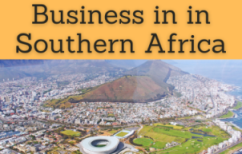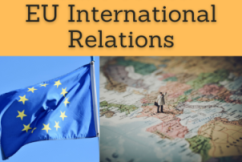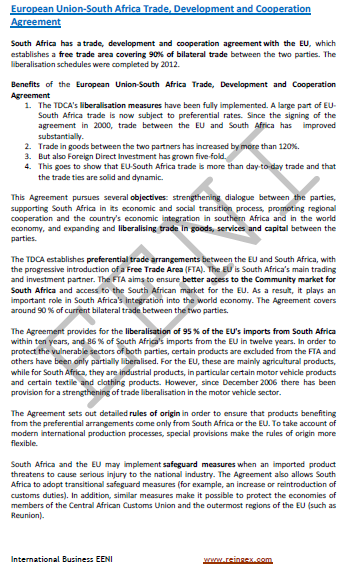European Union-South Africa Trade Agreement

South Africa-European Union Trade, Development and Cooperation Agreement
- Introduction to the Trade, Development and Cooperation Agreement between the EU and South Africa
- Key features of the South Africa-European Union Trade, Development and Cooperation Agreement

The Subject “European Union-South Africa Trade, Development and Cooperation Agreement” belongs to the following Online Programs taught by EENI Global Business School:
Doctorate in African Business, World Trade.
Courses: International Relations of Africa, Southern Africa.

Master in Business in Africa, International Business, Foreign Trade.

Masters adapted to  South African Students.
South African Students.
Masters adapted for  EU Students.
EU Students.

EENI Partnerships with Educational Institutions
Languages:  or
or  UE-Sudáfrica
UE-Sudáfrica  UE-Afrique du Sud
UE-Afrique du Sud  UE-África do Sul.
UE-África do Sul.

South Africa has in force a Trade, Development and Cooperation Agreement with the EU. The main objective is to create a free trade area covering 90% of the foreign trade between the countries of the EU and South Africa.
Sample - EU-South Africa Trade, Development and Cooperation Agreement:

The EU-South Africa Trade, Development and Cooperation Agreement seeks to increase and liberalize the reciprocal trade in goods, services and capitals.
Tolerance: 15% of the ex-works price (except for certain products).
Type of accumulation: diagonal, complete and bilateral.
Duty drawback under the EU-South Africa Trade, Development and Cooperation Agreement is authorized.
Compulsory EU Import Documents:
- Certificate of goods EUR.1 (issued by the Customs authorities of South Africa)
- Invoice declaration

The EU has an Economic Partnership Agreement (provisionally applied) with the Southern African Development Community (SADC) which also includes Botswana, Lesotho, Mozambique, South Africa and Eswatini.
The EU-South Africa Trade, Development and Cooperation Agreement belongs to the European Economic Area (Western Civilization) and African Civilization.
More information about South Africa (EENI African Business Portal).
South African Trade Agreements: SADC, COMESA-EAC-SADC Agreement, Southern African Customs Union (EFTA, India), IORA, Africa-BRICS, India-Africa, China-Africa...

(c) EENI Global Business School (1995-2024)
We do not use cookies
Top of this page


